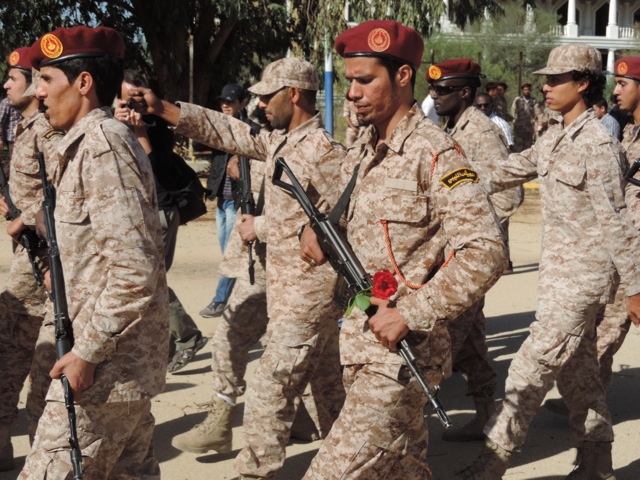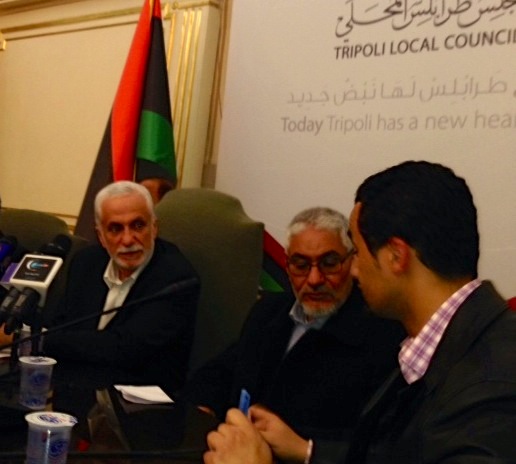By Umar Khan and Seraj Essul.

Tripoli, 21 November, 2013:
Five militia bases have been formally handed over to the national army in . . .[restrict]a series of ceremonies today. They were vacated by brigades that already fell under Interior or Defense ministries but had kept their internal command structure intact. Prime Minister Ali Zeidan attended two of the handovers and commended the brigades for taking the right step.
The five ceremonies featured the handover of the headquarters of Nawasi, Qaaqaa, Al-Madani and Al-Sawaq brigades and the anti-drug operation, Quwat Al-Rada.
The ceremonies took place during the day with many senior officials from government and military attending the events. Members of the General National Congress and Tripoli Local Council were also present.
The two attended by Prime Minister Ali Zeidan were at the headquarters of Al-Sawaq Brigade at the Islamic Call Society centre and of Quwat Al-Rada in Mitiga airbase. Zeidan thanked the revolutionaries for doing a “very big job for the 17 February revolution”.
“It is time to take the big step of making Libya a state with the complete rule of law. The only people carrying weapons should be army and police. It is a call for everyone anywhere in the country to take note of today and handover their weapons and bases to the national army. There will be no exceptions,” announced Zeidan.
Earlier today, the Qaaqaa Brigade handed over their base in the capital’s Fallah district to the Border and Facilities Guard, which comes under the Chief of Staff’s office. The brigade evacuated the base with all their weapons to an undisclosed location in compliance with GNC Law Nos. 27 and 53.
Jemal Al-Bakai, one of the unit commanders told the Libya Herald that the pull-out would be total, but also said he did not how many fighters were being evacuated. In the event, reporters saw no more than 30 technicals withdrawing through the main gate. “We aren’t leaving any weapons,” Bakai said, “We earned them during the war.” He added that 60 percent of the brigade were from from Tripoli.
“We are disbanding, ” said Bakai,“and some of us are going to join the army. Former army officers in the brigade have negotiated with the Ministry of Defence and will be allowed to rejoin the army with their former ranks. Those who were civilians and became rebels will join the army as training cadets”.
The Al-Medani Brigade, already under Ministry of Defense, was the second brigade to withdraw its forces todayand hand over the Yarmouk base in Salahadeen district to the Chief of Staff’s forces.
Brigade commander Ibrahim Al-Medani told the Libya Herald that there had been between “four and five thousand” fighters at the base, one of the largest in Libya, but that a lot of them had gone back to their jobs. He said that others might now be joining the army on an individual basis.
Asked why the brigade had only chosen to hand over the facility now, Medani said: “Gharghour was the biggest reason for our decision. We don’t want to be involved in the same sort of violence. We have been trying for over a year with the Ministry of Defence , the Chief of Staff and the government to organise the handover without jeopardising the base, by having it taken over by another militia…There was no pressure to move before – no one could have forced us out”. He added that he very much hoped that all other militias would now get out of Tripoli as well.
The headquarters of Quwat Al-Rada (the anti-drugs SWAT unit) inside the Mitiga base was also handed over to the Chief of Staff’s forces. The members of the unit have been told to individually join the Interior or Defense Ministries’ forces. The commander of the 3rd Infantry Regiment (Liwa Al-Thalat), Colonel Wanis Sahili, confirmed that the army was taking over the unit‘s weapons and equipment. He also thanked the unit for its extraordinary work in the past few months.
The Nawasi Brigade of Suq Al-Juma also quit its base this evening at an event attended by officials. Here Colonel Sahili asserted that the Nawasi was non-functional from today. He also said that his men had received the weapons from Nawasi and the members willing to continue a security career “would now join the forces individually in a professional way”.
The Al-Sawaq Brigade based in Islamic Call Society buildings also announced it was quitting the capital today. Speaking at the handover ceremony there, Zeidan said that he wished a speedy recovery to the wounded.
“After so many people died we had to intervene,” he said.
Referring to the general strike protesting the militias that has gripped the city for a week, Zeidan said that since the evacuation of all the brigades from the capital was becoming a reality, everyone should return to work. Addressing his comments to public servants, he said that if they did not end their strike, there would be consequences – but did not spell them out.
He stressed that no local authorities could make any “sovereign decisions for the country” – a clear reference to Tripoli Local Council’s continuing strike in the capital in a bid to force out all the militias there.
The evacuations meant that the state could assert its sovereignty and start to take control of weapons, the Prime Minister claimed. He revealed that he was going to ask Congress to pass new legislation which would dissolve every militia in the country and forbid anyone without a military ID number from holding a weapon, unless they had obtained a licence.
“Weapons have been at the heart of our problems,” Zeidan said. “ I assure you that if we stop the widespread holding of weapons, security will improve substantially.” He warned, however, that there were “powers” that did not want Libyans to enjoy freedom and security and that people needed to beware of them. He urged Libyans to support and cooperate with the police and army.
The enforcement of the GNC law Nos. 27 and 53 has surprised many in the city. The pressure generated by the calls for protest and civil disobedience by Tripoli Local Council (TLC) leader, Sadat Elbadri, gave a much-needed boost to the government, enabling it to pressure the brigades into disbanding or at least moving out of the capital. The tough stance of the TLC against brigades found much public support and Zeidan seized the chance by calling in the national army.
The departures by the brigades have pleased many in the capital but it remains to be seen if there will any real change on the ground. There are reports already circulating that brigades have simply moved out to farms? outside the capital.
With contributions from Ahmed Elumami, Ashraf Abdul Wahab, Houda Mzioudet, Aimen Eljali and Muhammad Elosta. [/restrict]










